Soldier Marshal
Marshal of the Soviet Union K. K. Rokossovsky
“I thought many times why everyone who somehow knew Rokossovsky treated him with unlimited respect. And the answer was only one suggestion: while remaining demanding, Konstantin respected people regardless of their rank and position. And this is the main thing that attracted him. ”
Marshal of the Armored Forces M.Ye. Katukov
"Rokossovsky was not afraid at the front, they loved him."
N.A. Antipenko
120 years ago, 9 (21) December 1896, the future outstanding Soviet military leader, Marshal of the Soviet Union, twice Hero of the Soviet Union, commander of the Victory Parade in Moscow in 1945, was born Konstantin Rokossovsky. Konstantin Rokossovsky is one of the best, and possibly the best, commander of the Great Patriotic War.
Born in Warsaw in a working-class family. Father - Pole Xavier Jozef Rokossovsky (1853 — 1902), descended from the impoverished noble family of Rokossovsky, an auditor of the Warsaw Railway. Mother - Belarusian Antonina (Atonida) Ovsyannikov. Later, due to the constant distortion of the patronymic, Konstantin Rokossovsky became known as Konstantin Konstantinovich. His father died early and Konstantin worked from a young age: as a pastry chef, then as a dentist, as a stone cutter.
For self-education, Konstantin read a lot of books in Polish and Russian. “From early childhood,” recalled Konstantin Konstantinovich, “I was fascinated by books about war, military campaigns, battles, bold cavalry attacks ... My dream was to try everything that was said in the books myself.” And his dream came true to the fullest.
The beginning of the military path
At the very beginning of the First World War, he volunteered (hunter) to the 5 th Dragoon Kargopol 5 Cavalry Regiment. He fought on the Western and South-Western fronts. He proved himself a good fighter in equestrian intelligence, for which he was awarded the St. George Cross of 4 degree and was promoted to the corporal. In 1915, in a battle near the city of Ponevezh, Rokossovsky attacked a German artillery battery, was presented to the St. George Cross of the 3 degree, but did not receive the award. In the battle for the railway station, the Troshkuns, along with several dragoons, secretly captured the German military field trench, and on July 20 was awarded the St. George Medal of the 4 degree.
During the war, Konstantin was an excellent intelligence officer; in 1916, he acted as part of a partisan detachment (so called special reconnaissance and sabotage units created from volunteers) formed from dragoons. May 6 received the St. George 3 Medal for the attack of the German outpost. In March, 1917 was promoted to junior non-commissioned officer. Rokossovsky continued his military service and 21 was awarded the St. George Medal of the 2 degree in November. The dragoons chose Rokossovsky as a squadron and then as a regimental committee that decided the life of the regiment. In December 1917, Konstantin Rokossovsky joined the Red Guard. He served in the Kargopol Red Guard cavalry detachment, as an assistant chief of the detachment.
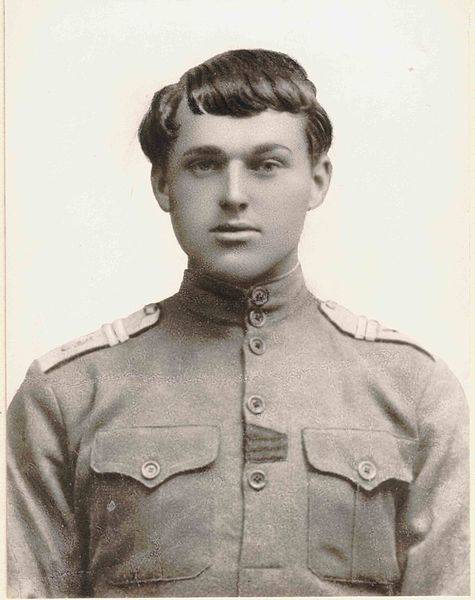
Junior non-commissioned officer K. Rokossovsky. 1917 year
In the Red Army during the Civil War he commanded a squadron, a separate battalion and a cavalry regiment. Rokossovsky participated in the suppression of counter-revolutionary uprisings, in the suppression of anarchist and Cossack speeches, he fought on the Eastern front with the Czechoslovakians and the White Guards. In the summer of 1921, commanding the Red 35 Cavalry Regiment, in the battle near Troitskavask defeated the 2 Brigade of General B. P. Rezukhin from the Asian Equestrian Division, General Baron von Ungern-Sternberg, and was seriously wounded. For this fight Rokossovsky was awarded the Order of the Red Banner. In October, 1921 was appointed commander of the 3 Brigade of the 5 Kuban Cavalry Division. In October, 1922, due to the re-formation of the 5 division into a separate 5-th Kuban cavalry brigade, was voluntarily appointed to the position of commander of the 27-th cavalry regiment of the same brigade. In 1923-1924 participated in the battles against the White Guard detachments that had entered the territory of the USSR, in Transbaikalia.
His certification noted: “It has a strong will, energetic, resolute. Has dashingness and composure. Sustained Able to take a useful initiative. The situation understands well. Smart. In relation to his subordinates, as well as to himself, he is demanding. He loves military affairs ... He was awarded two Orders of the Red Banner for operations on the Eastern Front against Kolchak and Ungern. Tasks organizational nature performed carefully. In view of the non-receipt of special military education, it is desirable to send him to the courses. The posts of the regiment are quite consistent. ”
Before the Great War
After graduating from 1925 in August, the cavalry advanced training courses for commanders served in Mongolia as an instructor for a separate Mongolian cavalry division. From January to April, 1929 passed advanced training courses for top commanders at the Academy. M. V. Frunze. In 1929, commanding the 5-th Separate Kuban Cavalry Brigade, participated in the battles on the CER. From 1930, the commander of the 7 th Samara, and then 15 th Separate Kuban cavalry divisions. In 1935, he received the title of divisional commander. From 1936, the Rokossovsky commanded the 5 Cavalry Corps in Pskov.
In 1937, he was expelled from the CPSU (b) “for the loss of class vigilance” and was dismissed from the Red Army “due to official mismatch”. In August, 1937 was arrested on charges of having links with the Polish and Japanese intelligence services, becoming a victim of false testimony. Two and a half years spent under investigation. Despite the pressure, Rokossovsky did not give false testimony either to himself or to others. 22 March 1940 of the year Rokossovsky was released due to the termination of the case, at the request of C. K. Timoshenko to I. Stalin, and rehabilitated. Konstantin Konstantinovich is fully restored in his rights, in office and in the party, and sent to improve his health at a resort in Sochi. In the same year, with the introduction of general ranks in the Red Army, he was given the rank of Major General. After the leave, Rokossovsky is appointed at the disposal of the commander of the Kiev Special Military District (KOVO), Army General G. K. Zhukov, and is headed by the 5 th Corps Corps. From November 1940 was the commander of the 9-m mechanized corps of the Kiev Special Military District, which began to be formed in KOVO.
Great Patriotic War
Rokossovsky’s tremendous military talent was fully revealed in the Great War. On the morning of June 22, 1941, Konstantin Konstantinovich raised his corps on a combat alert, and having made a multi-kilometer march, he immediately went into battle. The head of the operations department of the headquarters of the Southwestern Front I. Kh. Baghramyan recalled: “The third day of the war was coming to an end. An increasingly alarming situation developed on the Southwestern Front. The threat, in particular, loomed over Lutsk, where the 15th mechanized corps of General I.I. Karpezo needed urgent support, otherwise tank the wedges of the enemy could cut and crush him. Part of the 87th and 124th rifle divisions surrounded by the enemy near Lutsk were also waiting for help. And when we were racking our brains at the front headquarters on how to help out the Lutsk group, the main forces of the 131st motorized and advanced detachments of the tank divisions of the 9th mechanized corps commanded by K.K. arrived there. Rokossovsky. Reading his report on this, we literally did not believe our eyes. How did Konstantin Konstantinovich manage this? After all, his so-called motorized division could only follow ... on foot. It turns out that the decisive and initiative commander of the corps on the first day of the war took all the vehicles from the district reserve in Shepetivka at their own peril and risk — and there were about two hundred of them — put the infantry on them and moved in front of the corps with a combined march. The approach of its units to the region of Lutsk saved the situation. They stopped the enemy tanks that had broken through and rendered significant assistance to the formations withdrawing in a difficult situation. ”
Until July 11, Konstantin Konstantinovich continued to command the 1941 Mechanized Corps on the South-Western Front. Corps fought with the enemy in the battle of Dubno-Lutsk-Brody. Despite the shortage of tanks and transport, the troops of the 9 th mechanized corps during June - July 9, the German forces exhausted the active defense, retreating only by order. For his success, the general was introduced to the 1941-th Order of the "Red Banner".
July 11 1941 was appointed commander of the 16 Army on the Western Front. July 17 Rokossovsky arrived at the headquarters of the Western Front, however, due to the deteriorating situation, he was assigned to lead the task force to restore the situation in the Smolensk region. Rokossovsky with a group of officers collected the remnants of the 19, 20 and 16 armies, leaving the encirclement. Konstantin Konstantinovich recalled: “In a short time, a decent number of people gathered. There were infantrymen, gunners, signalers, sappers, machine gunners, mortar gunners, medical workers ... There were quite a few trucks at our disposal. They are very useful to us. Thus, in the course of the fighting, a formation began in the Yartsevo area of the formation, which received the official name "General Rokossovsky's group". Rokossovsky's group contributed to the liberation of the Soviet armies surrounded in the Smolensk region. On August 10, it was reorganized into the 16 Army (of the second formation), and Rokossovsky became the commander of this army; 11 September 1941 received the rank of lieutenant general.
The troops under his command participated in the battle of Moscow 1941-1942. At the beginning of the Moscow battle, the main forces of the 16 Army of Rokossovsky got into the Vyazemsky "boiler", but the management of the 16 Army, which the troops of the 19 Army transferred, was already taken to the rear. Rokossovsky's new 16 Army was ordered to cover the Volokolamsk sector, and Rokossovsky again had to gather his troops. Rokossovsky intercepted troops on the march; at his disposal a separate cadet regiment, created on the basis of the Moscow Infantry School. Supreme Soviet of the RSFSR, 316-th Infantry Division, Major-General I. V. Panfilov, 3-th Cavalry Corps, Major-General LM M. Dovator. These troops will enter history, glorifying himself fierce battles with the enemy.
As Rokossovsky later wrote: “In connection with the breakthrough of the defense in the area of the 30 Army and the withdrawal of units of the 5 Army, the troops of the 16 Army fighting for every meter, in fierce battles were driven back to Moscow at the turn: north of Krasnaya Polyana, Kryukovo, Istra, and at this turn in fierce battles, finally stopped the German offensive, and then going into a general counterattack, together with other armies, conducted according to the plan of Comrade Stalin, the enemy was defeated and thrown far from Moscow. ”
It is worth noting the iron will of the Soviet commander. He never doubted success and victory. And this iron will was passed on to all his comrades. At the same time, he tried hard to beat the enemy at the cost of the least of his own victims. In the hardest 1941 in October, in an interview with a Red Star correspondent, he said with conviction: “When fighting near Moscow, you need to think about Berlin. Soviet troops will definitely be in Berlin. ” Rokossovsky also possessed an intuition, in fact, the gift of foresight. He almost always unmistakably guessed the intentions of the enemy, preempted them and, as a rule, emerged victorious. This was noted by many of his contemporaries.
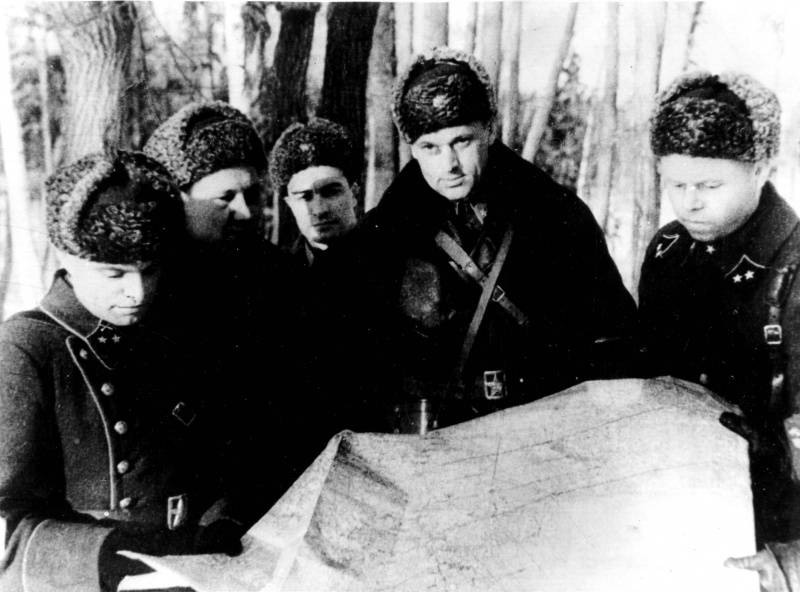
The commander of the 16 Army, Lieutenant-General K. K. Rokossovsky with his headquarters in the Istra region. From left to right: Major General of Artillery V. I. Kazakov, member of the Military Council Divisional Commissar A. A. Lobachev, Army Commander Lieutenant-General K. K. Rokossovsky, Chief of Staff Major-General M. S. Malinin
During the defensive battles near Moscow, Rokossovsky successfully conducted an operation to defeat the German forces in the direction of Volokolamsk, Istra, and Ostashkovo. For the battle of Moscow K. K. Rokossovsky was awarded the Order of Lenin. 8 March 1942, Rokossovsky was seriously injured by a shell fragment (right lung, liver, ribs and spine were affected). Rokossovsky was treated until May 23 1942 g, then again headed the 16 th army.
From July 1942, Mr. K. K. Rokossovsky - commander of the troops of Bryansk, and from September - the Don fronts. Under his command, the fronts participated in the Battle of Stalingrad. With his participation, a plan of Operation Uran was developed to encircle and destroy the enemy group advancing on Stalingrad. During the counter-offensive near Stalingrad, the Don Front troops, together with the troops of the South-Western and Stalingrad fronts, broke through the defenses of the German army and surrounded the Don and Volga rivers, including a group of 330 thousand men. The headquarters commissioned the Don Front, led by Rokossovsky, who received the rank of colonel general on January 15 on January 1943. At the beginning of 1943, the front forces liquidated the opposing grouping of field marshal von Paulus. 28 January 1943, Rokossovsky was awarded the newly established Order of Suvorov.
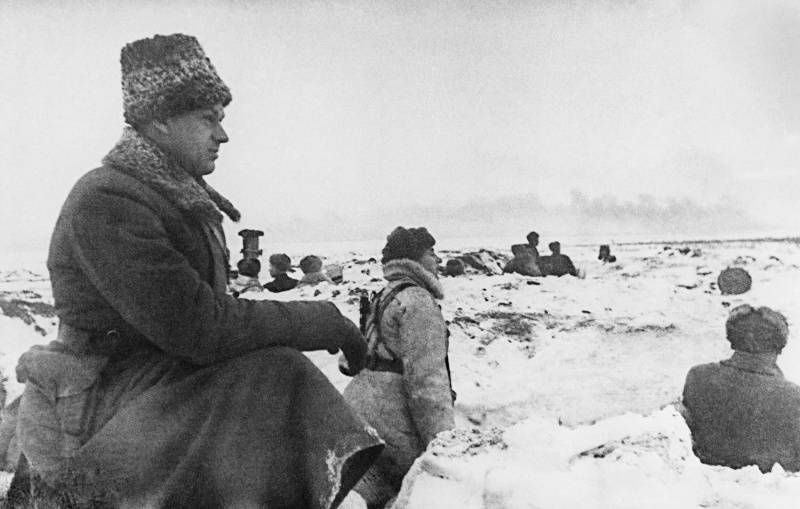
Commander of the Don Front, Lieutenant-General Konstantin Konstantinovich Rokossovsky at an observation post in the Marinovka area
From February 1943 KK Rokossovsky - commander of the Central Front, who took part in the Battle of Kursk 1943 and the Battle of the Dnieper in August-October 1943. In April 1943 was given the rank of army general. The glory of Konstantin Konstantinovich already rattled on all fronts, he became widely known in the West as one of the most talented Soviet military leaders. Rokossovsky was very popular among the soldiers.
As Marshal A.M. Vasilevsky noted: “I want to say a few warm, heartfelt words about the common favorite of the Red Army, Konstantin Konstantinovich Rokossovsky .... This is one of the outstanding commanders of our Armed Forces ... .. Commanding a number of fronts, and always in highly responsible areas, Konstantin Konstantinovich with his hard work, great knowledge, courage, bravery, tremendous efficiency and constant care for his subordinates gained extraordinary respect and ardent love. I am happy that I had the opportunity during the Great Patriotic War to witness the commanding talent of Konstantin Konstantinovich, his enviable calm in all cases, the ability to find a wise solution to the most difficult issue. I have repeatedly observed how the troops under the command of Rokossovsky brutally beat the enemy, sometimes in extremely difficult conditions for them. ”
Other Soviet commanders also spoke about the love of soldiers for Rokossovsky. Chief Marshal of the Armored Forces A. Kh. Babajanyan noted: “When telling about the meeting with K. K. Rokossovsky, and I had several of them, I want to emphasize once again the charm of Konstantin Konstantinovich, who generated deep sympathy for him not only among those he had direct official contact with him, but also among the broad masses of soldiers. Rokossovsky remembered and personally knew hundreds of people, cared for them, never forgot about those who are worthy of encouragement and reward, knew how to delve into the affairs and concerns of commanders, knew how to listen to everyone sympathetically. ”
Marshal of Artillery V.I. Kazakov: “Konstantin Konstantinovich possessed ... precious qualities that had a great influence on those around him ... He was unusually simple and genuinely modest, sensitive and fair. A man of high culture, he was able to patiently listen to everyone, immediately highlight the main idea in the judgments of the interlocutor and use the knowledge of the collective in the interests of the cause. ”
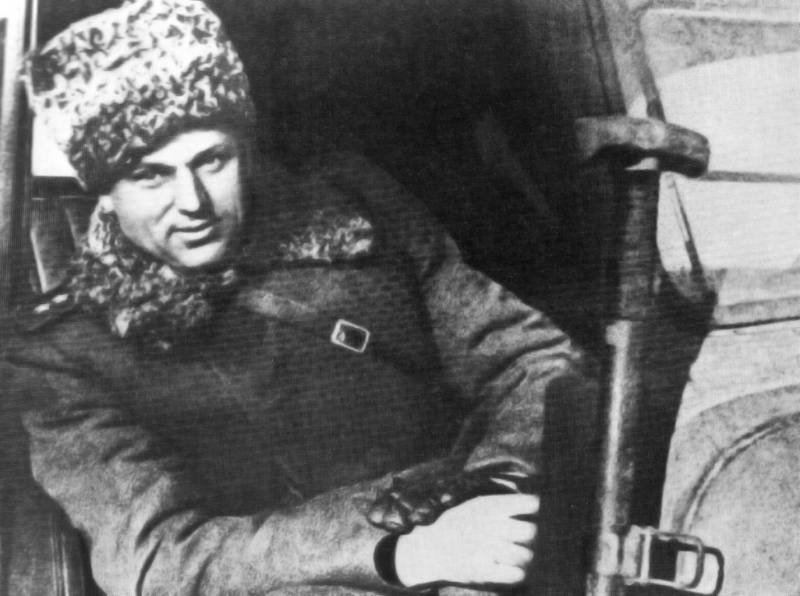
Commander of the Don Front, Army General K. K. Rokossovsky in Stalingrad after victory
After the Battle of Kursk, Rokossovsky successfully conducted the Chernigov-Pripyat, Gomel-Rechytsa, Kalinkovich-Mozyr and Rogachev-Zhlobin operations by the Central (since October 1943 of the renamed Belarusian) front. From February 1944, the Rokossovsky commander of the troops of the 1 of the Belarusian Front, who participated in the Belarusian operation. Here the talent of the commander was manifested in the application of two powerful blows by the troops of the front in converging directions. Operation Bagration has become one of the best strategic operations of the Great War. As part of the Belarusian operation, Rokossovsky successfully conducts the Bobruisk, Minsk and Lublin-Brest operations.
The success of the operation significantly exceeded the expectations of the Soviet command. As a result of the two-month offensive, Belarus was completely liberated, a part of the Baltic states was repulsed, and the eastern regions of Poland were liberated. The German Army Group Center was almost completely defeated. In addition, the operation threatened Army Group North in the Baltic States. 29 June 1944 was awarded the diamond star of the Marshal of the Soviet Union to Army General Rokossovsky, and July 30 was the first Star of the Hero of the Soviet Union.
From November 1944 until the end of the war K.K. Rokossovsky - commander of the 2 of the Byelorussian Front. Subordinate troops took part in the East Prussian, East Pomeranian operations, during which large German groups were defeated in East Prussia and Pomerania. During the Berlin offensive, the troops of the 2 of the Belorussian Front under the command of K.K. Rokossovsky pinned down the main forces of the 3 of the German Panzer Army, depriving it of the opportunity to participate in the battle for Berlin, and defeated the enemy's Stettin grouping. The withdrawal of Soviet troops on the Baltic coast did not give the German command the opportunity to transfer troops from Courland from Germany to defend Germany. In preparing and conducting these operations, he creatively applied the most important principles of Soviet military art: he resolutely massaged forces and means in the directions of the main attacks, boldly maneuvered reserves and at the same time always took into account the strengths and weaknesses of the enemy, eliminating the pattern in the fighting.
31 March 1945 Marshal Rokossovsky was one of the first Soviet commanders "for the skilful leadership of major operations, which resulted in outstanding success in defeating the German fascist troops," was awarded the Order "Victory". 1 June 1945, Rokossovsky was awarded the second Gold Star medal. 24 June 1945 Marshal of the Soviet Union K.K. Rokossovsky, by Stalin’s decision, commanded the Victory Parade in Moscow. “I took the command of the Victory Parade as the highest award for all my many years of service in the Armed Forces,” the Marshal said at a Kremlin reception in honor of the parade participants.
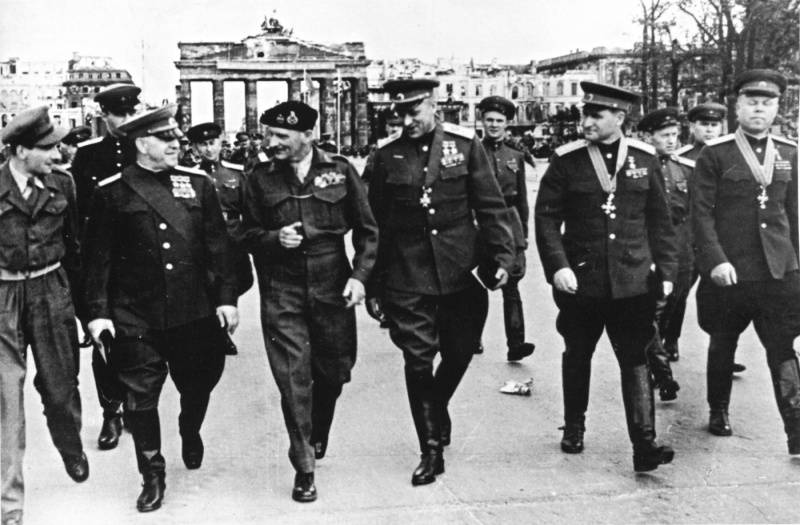
Soviet commanders G. K. Zhukov, K. K. Rokossovsky, V. D. Sokolovsky, M. S. Malinin and British Field Marshal Montgomery march through the streets of Berlin after the award ceremony
Further service
From July 1945 to 1949, by order of the Supreme Commander, Rokossovsky - Commander-in-Chief of the Northern Group of Forces in Poland. In October 1949, at the request of the Government of the Polish People’s Republic (NDP) and with the permission of the Soviet government, Rokossovsky left for Poland, where he was appointed Minister of National Defense and Deputy Chairman of the Council of Ministers of the NDP. In Poland, he was awarded the military rank of "Marshal of Poland". He did a lot of work on rearmament, structural reorganization of the Polish army, raising defenses and combat readiness in the light of modern requirements, while maintaining its national identity. In the interests of the army in Poland, communications and communications were modernized, and the military industry was created. In April, 1950 introduced a new Charter for the internal service of the Polish Army. Training was based on the experience of the Soviet Army. For training officers opened the Academy of the General Staff. K. Sverchevsky, Military Technical Academy. J. Dombrowski and the Military-Political Academy. F. Dzerzhinsky. He also served as Deputy Chairman of the Council of Ministers of Poland, was elected a member of the Political Bureau of the PUWP Central Committee and a member of the Seimas.
After the death of President Boleslav Beruta (12 in March 1956), who died under mysterious circumstances in Moscow (possibly eliminated as a supporter of Stalin), the anti-Stalinist Wladimir Gomulka was elected the first secretary of the PUWP. The conflict between Rokossovsky's supported Stalinists and anti-Stalinists in the PUWP led to Rokossovsky being removed from the Politburo of the PUWP Central Committee and the Ministry of National Defense as a "symbol of Stalinism." October 22 in a letter to the Central Committee of the Polish United Workers' Party, signed by N. S. Khrushchev, the Soviet side agreed with this decision. Rokossovsky left for the USSR and did not come to Poland anymore.
Returning to the USSR, Rokossovsky was appointed deputy minister of defense, and from July 1957, the chief inspector, deputy minister of defense. From October 1957, he commanded the troops of the Transcaucasian Military District. In 1958-1962 - Deputy Minister and Chief Inspector of the USSR Ministry of Defense. In April, 1962 Khrushchev suggested that Rokossovsky write an article about Stalin in the spirit of the resolution of the 20th CPSU Congress on the “personality cult”. But the marshal resolutely refused to perform this slander, and the next day he was removed from office.
Since April, 1962 Rokossovsky in the Group of Inspectors General of the Ministry of Defense of the USSR, where he did much to study the experience of the past war and the scientific and technological revolution in military affairs. Author of a number of military theoretical works on the history of the Great Patriotic War.
3 August 1968, Rokossovsky died of prostate cancer. Urn with ashes of K.K. Rokossovskogo buried in the Kremlin wall on Red Square in Moscow.
One of the most outstanding creators of the Great Victory, Rokossovsky summed up his leadership activities: “The greatest happiness for a soldier is the knowledge that you helped your people defeat the enemy, defend the freedom of the Motherland, return peace to it. The consciousness that you have fulfilled your duty as a soldier is a heavy and noble duty, above which there is nothing on earth! ”
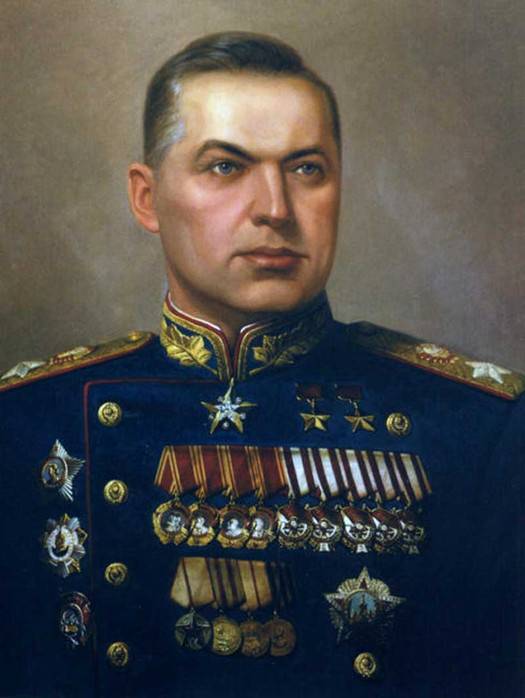
Information